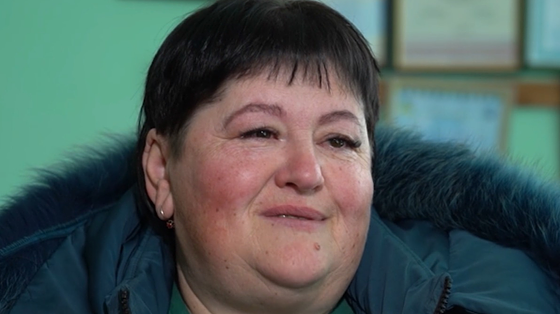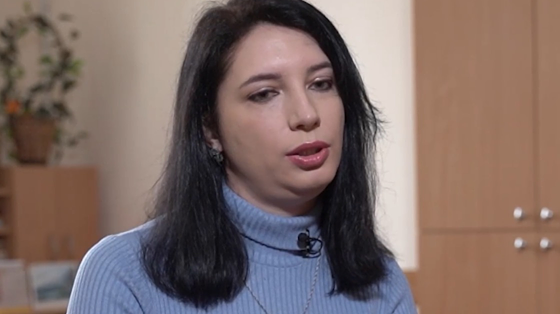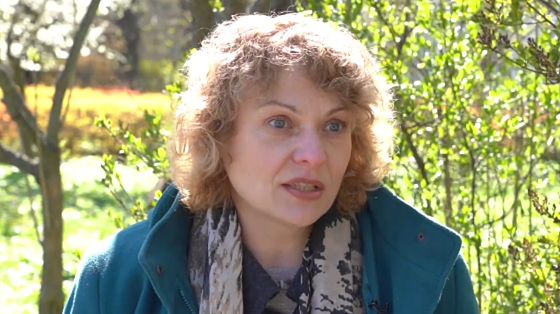Artillery is better than aerial bombs. Death from an air raid is not as terrible as starvation. Zlatoslava Malynovska had this bloodstained and terrible experience for three weeks in the besieged Mariupol. Her home in her hometown was destroyed... But she dreams of returning to Ukraine, to her hometown Mariupol.
On 24 February, like millions of other Ukrainians, I woke up to the sounds of an explosion. At that time, I did not live in the city centre. The place where I lived was not far from the airport, which had been there some (long) time ago… I woke up to the sound of explosions. The distance to the airport was about one kilometre. I woke up and did not understand what was happening. My friend, Zlata, started calling me and said, “The war has started, we are being bombed.” I thought that everything would end with the military bases. They first began to destroy some military facilities. I did not have a single thought that bombs would fly into residential houses.
The most terrible things began on 26 February because on that date all our news channels in Mariupol... Some talks started that the sounds of explosions were heard not outside the city but were coming closer to the city. That day, my friend called me and said, “Come to a flat in the centre – we still have a flat down town.” There was a flat... “Come there because it is safer there.” That is, this was the city centre, not the outskirts where I lived. That was down town and it could be safer there.
On 26 February, I went to the city centre and, as I realized then, it would be safer to stay where I was before.
When I moved to the city centre, my boyfriend and I met. We went to refuel the car because we then immediately realized: if food in the stores was nearly sold out, the main thing was to have gasoline for your car. We stood in a long queue, for some 3-4 hours. We were among those few lucky ones who had gasoline. There were many neighbours who had cars, but did not have gasoline anymore. At that time, gasoline was like water, like food, a chance to go somewhere. On 26 February, I came to the city centre and heard some explosions that were somewhere close. There was still a feeling that it all would end soon. When we still had a telephone connection, water, electricity and gas, everything was not so scary.
On 1 March, the electricity was cut off but there was still a telephone connection. There was telephone signal still, but there were no more sirens. I actually heard [a siren] in Mariupol only once. On 2-3 March, we did not have the telephone signal anymore. The Internet was not available. That was when we felt scary, as we had no information about what was happening in our country then. We did not know what was happening in the neighbouring district. When water and gas were turned off (it was on 4-5 March), then very strong hostilities began and they affected the city centre.
When I went to my grandmother’s place, I met my boyfriend and he told me that a bomb was dropped a couple of blocks down the street. He engaged in volunteering activities. And when he came from the Red Cross to see me, he said that there were dead bodies in the streets. When I went to my grandmother’s place, I heard the sounds of Grad MLRSs. There were artillery fire attacks.
When you are in Mariupol, you understand that artillery is quite a normal thing. However, on 8 March, a real hell began.
If I am asked to describe Mariupol and what happened and is happening there now in one word, it is worse than hell. Especially when the air raids started. They were really 24/7. We even counted that two planes flew every two hours. They took some time to refuel and then flew back to Mariupol and dropped their bombs. When we heard the plane, we went out into the corridor, although we adequately understood that the rule of two walls would not help us. We went out into the corridor, listened and counted. According to our calculations, when there was an air raid on the city, about four bombs were dropped. We heard when it fell in the distance. We were close to the bomb shelter and when we heard an explosion close, we went into the shelter. There were a lot of people there.
And we sat and thought that even if the bomb hit, then the bomb shelter would not save us.
The feeling of fear, it was evolving every day. While at the very beginning, you are just afraid of death, when you see it, when you hear it, when you realize that once you go outside, some rocket or projectile might hit you. You are just afraid of death. But then, during an air raid, you are afraid of remaining under the rubble and being dying there for a while... Hunger… Hunger and lack of water were terrible things too. On the third week, the shops were ransacked and there was no water anywhere.
It was March. It was still snowing and we were all happy about the snow. Obviously, it was cold to sleep without heating. And that was so if you still had windows left intact. We were glad to have the snow because that meant water. We woke up in the morning, took the buckets and went to collect the snow from the cars. Then we dumped it into the bathtub. At first, we considered it as technical water. Later, when there was no water at all, we drank this water. First, we filtered it through cotton wool and activated charcoal, then boiled it and drank it.
It was a normal thing when going out of the entrance door, you could step over the head of a pigeon. Across the road, a warehouse with food for animals was opened. People took food for their dogs and cats there. And many people took bird food to feed the pigeons and then eat them.
This is frightening. On 11 March, we had a quiet evening. We then called it as suspiciously and terrifyingly quiet. No aircrafts and no sounds of distant explosions were heard from 9 o’clock in the evening. It was very quiet. And we then thought, “Maybe the war has ended, everything is fine again and soon everything will be back to normal?” We went to bed but we had one person always on the alert, on guard.
On 11 March, at 11 o’clock in the evening, my family and Lisa, my brother’s wife, woke me up. She said, “An airplane.” It was flying very close. While earlier we heard that it was flying above us, then now it was flying really close and it was very loud. We got up. In a moment, as I was getting up, we heard the loudest sound we ever heard over that period. Our door... it was blown out. The windowpanes were blown out together with the window frames. There was a very strong strike and it seemed to us that it hit our house.
It was a feeling of complete bewilderment because you don’t know what to do. It seems that the whole ground has gone off from under your feet.
You drop down on your knees from this blast wave. You try to grab your cat to flee together with him – he ran under the bed. We went to the bomb shelter. All the people in this shelter were in a panic. Everyone started to go downstairs from their flats, as everyone thought that it hit into the house. Yet nobody could get out. We locked the entrance doors to the house so that no looters and murderers would come to us. I could not stay there for more than five minutes. I went back upstairs and took the cat. Everyone shouted to me, “Go back! Now it’s coming again!” That day, not only all the people in the house were awake. Probably, the residents of the whole city centre did not sleep. That day, many air bombs were dropped on residential buildings.
At 5 o’clock in the morning, we went outside. We saw a neighbouring house, it was one owner’s private house, which burned all night long – a bomb hit it.
A man came up to us and people asked him, “Where is your house?” He said, “I don’t have it anymore.” He was standing there, his eyes welling up with tears. He began to cry because his family was in that house.
He was the only one left. I don’t know further fate of this man but I remember how he cried. He sobbed and did not know what to do because his family was in that house. They could not start clearing and removing the rubble now because it was still on fire. After that, we spent the night in the bomb shelter. The bomb shelter was very warm. There were a lot of people there and we could not lie down. We were all sitting. We slept in a sitting position because there were a lot of people there. We heard from our neighbours that someone said we could leave the city. We packed up – all the families, young people, and we all left. About seven cars from our house, I think. The rest of the people, even those who had a car, did not believe it and stayed there. On 16 March, a bomb was dropped on the house where we had been.
We left at 10 o’clock in the morning. We drove to the sailors’ village and there was a huge convoy of cars there. From the “Arrow” road crossing to the exit from the city, probably along the distance of some two kilometres, we were in the convoy all the way. All this time we heard a plane flying. We understood that now, if a bomb was dropped, a huge number of people would suffer. So many people and so many cars... Other place where I saw such a big crowd of people was at the drama theatre in Mariupol. Even when I went to the drama theatre in Mariupol, I thought how dangerous it was. How do people stand in such a crowd?
A couple of air bombs are dropped now – and that’s it, these people are gone. We thought about this when we stood in a queue for water.
The drama theatre was the only place where one could learn some news. While you stand in the queue for water, a man comes up to you and, like in the old days, when there was no Internet, they give you an A4 sheet with all the news for 13 March. Those were the only news we learned when we were in Mariupol. We were lucky as we left. By nightfall, we were already in Berdiansk. Everything was fine. I was lucky, luckier than my boyfriend, who was leaving on 17 March. He was busy with volunteering until the last moment. He helped his friends to take people out of the areas where there was strong street fighting. There were already Russian soldiers there. He was leaving and at the last checkpoint before Berdiansk, he was stopped, as they checked the phones of “suspicious individuals”. He was stopped and ordered to show his tattoos, to undress. They humiliated him and checked his phone. He had a message on his phone addressed to his sister saying that he was going to join the territorial defence units. Then he did not go there, and a few days later, he wrote that he signed up as a volunteer for the Red Cross. He began to be involved in volunteering in Mariupol.
The soldiers found those messages and they did not care that he was not in the territorial defence units, but joined the volunteering activities. They kept him at the checkpoint for six hours and beat him.
They told him he was going to the jail now. Six hours. It was a torturing. They broke his rib, took away his watch and said that if he tells their commander that he was beaten, he would not leave there. I lost everything: I lost my city and I lost my dreams. All this was destroyed. My heart and my soul are in this city. I believe it will, but at what cost? So many of my friends died in Mariupol... My friend died on 8 May defending Azovstal. I will return to Ukraine. I want to go back to my city. I want to be back to Ukrainian Mariupol. And I believe that it will be so.







.png)



